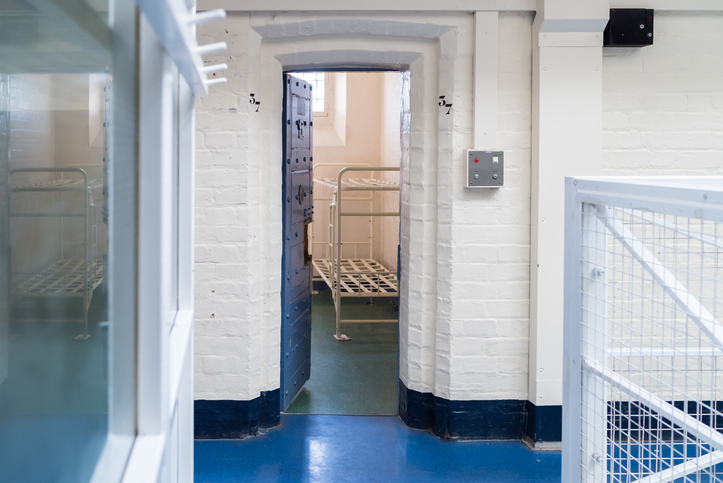The announcement from the Ministry of Justice (MoJ) is couched in bureaucratic language, but there is no disguising it. ‘Process activated to manage prisoner movements’, said the headline on the department’s website, making it sound like a few minor procedural rules have been adjusted to help the transfer of inmates. In fact, the ‘process’ is an emergency measure to stop people being sent to prisons which are full.
The system is not working as it should.
The areas worst affected – or as the MoJ puts it those with ‘capacity concerns’ – are men’s jails in the north of England. There, prison cells will, in effect, be rationed. Suspects who were due to be taken to court for a hearing which might have resulted in them being remanded in custody will instead be held for longer in a police cell until a prison place becomes available. In some cases, hearings will be delayed and alleged criminals released on police bail.
The MoJ calls this emergency scheme Operation Early Dawn because it involves an assessment at the start of each morning about which defendants should be prioritised for a court hearing. In a properly functioning criminal justice system, with sufficient prison capacity, there would be no need for that: when someone is due to be in court, they would be taken to court. But the system is not working as it should.
The underlying reason is principally a huge planning failure by the previous administration. Between 2010 and 2023, the Conservatives closed 10,700 prison places and created only 11,000 new ones, a net increase of just 300 places. Ambitious plans to build 20,000 extra places by the mid-2020s did not materialise with only 6,000 provided. It meant many jails remained overcrowded and perilously close to capacity.
At the same time, offenders were spending longer in jail, due to legislative changes, a drift towards more punitive sentences and greater use of open-ended prison terms. In 14 years, the average custodial sentence length went up by 50 per cent, from 14 months to 21 months. Trial delays, exacerbated by the Covid pandemic, led to a surge in the number of prisoners held on remand, while stricter rules about the behaviour of released prisoners has resulted in a rise in ‘recalls’ – offenders who are sent back to jail.
The prison population pressures have also been compounded by Boris Johnson’s decision in 2019 to hire 20,000 police officers within three years. Politically, the officer recruitment campaign was an astute move – neutralising the issue of police cuts in the lead-up to that year’s general election – and it was welcomed by chief constables desperate to strengthen their workforce after nearly a decade of cuts. But the plans weren’t thought through. More officers would inevitably mean more arrests, more charges, more convictions and more prison sentences – but there was no commensurate increase in prosecutors, court staff, judges and prison places. In February, the MoJ forecast that the prison population would increase to 99,500 by November 2025 and to 105,400 by the end of 2027. One of the factors identified by the MoJ for the projected increase was the ‘continued growth in police charging’.
Since 2022, there’ve been a series of ‘emergency’ interventions to reduce the prison population and free up space. First, there was Operation Safeguard, where police cells are used to hold prisoners overnight where there aren’t any prison cells. Then, came an instruction to the judiciary, at the instigation of the then Justice Secretary Dominic Raab, to take prison capacity into account during sentencing and consider suspending prison terms. And finally, as a last resort, the previous government sanctioned the early release of more than 10,000 inmates (though the figure was revealed only after the election).
When Labour came to power it found that the bath was still close to overflowing. It announced that in September and October it would begin freeing 5,500 prisoners who’d served 40 per cent of their sentence rather than the standard 50 per cent. The riots have now forced ministers to take action even sooner – hence Early Dawn. Following the disturbances, about 400 people have been remanded into custody or jailed, leaving fewer than 500 places in 100 men’s prisons across England and Wales. The system is about to burst.
So far, the government’s message has been that it will deal with the capacity crisis it inherited from the Tories and build the prison places they failed to provide. But the prison system will need more fundamental change. The clue as to how that might be delivered is contained in a little-noticed section of Labour’s manifesto.
It said: ‘Even when criminals are found guilty, the sentences they receive often do not make sense either to victims or the wider public. This is particularly worrying for offences against women and girls. Labour will carry out a review of sentencing to ensure it is brought up to date.’
Although one purpose of the sentencing review may be to toughen up sentences for men who commit crimes against women and girls, it should also be the vehicle that delivers wider reform, in particular, a stronger community-based sentencing regime with satellite tagging, curfews, unpaid work and behaviour programmes.
There has to be an alternative to imprisonment for non-violent criminals that commands confidence among magistrates, judges and the wider public so that jail is no longer seen as the only punitive option. The sentencing review can’t come soon enough.







Comments